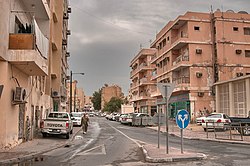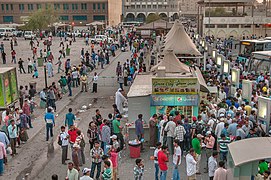Old Al Ghanim
Old Al Ghanim
الغانم العتيق | |
|---|---|
 Al Khaybar Street in Old Al Ghanim | |
| Coordinates: 25°16′42″N 51°32′29″E / 25.27833°N 51.54139°E | |
| Country | |
| Municipality | Ad Dawhah |
| Zone | Zone 6, Zone 16 |
| District no. | 8 |
| Area | |
| • Total | 0.3 sq mi (0.7 km2) |
| Population (2010) | |
| • Total | 17,692 |
| • Density | 65,000/sq mi (25,000/km2) |
Old Al Ghanim (Arabic: الغانم العتيق, romanized: Al-Ghānim at-'Tīq) is a neighborhood of the Qatari capital Doha, located in the municipality of Ad Dawhah. It forms a part of Doha's historic downtown.[1] A notable landmark was the New World Centre, a supermarket established in 1987.[1] It has since been relocated.[2] Numerous other local businesses have also been relocated to other parts of Doha by the Ministry of Municipality and Environment so it could carry out massive-scale reconstruction of the neighborhood and clear out portions to make way for the Doha Metro.[1] The Al Ghanim Central Bus station is another important landmark found here.
Etymology
[edit]The district derives its name from the Al Ghanim branch of the Al Bin Ali tribe.[3]
History
[edit]Old Al Ghanim first emerged as a district of Doha around the 1950s.[3]
Infrastructure
[edit]Indian healthcare company Aster DM Healthcare opened a clinic in Old Al Ghanim in October 2014.[4]
Transport
[edit]Transportation company Mowasalat's main bus station is located in Old Al Ghanim.[5]
Major roads that run through the district are Grand Hamad Street, Ahmed Bin Mohammed Bin Thani Street, Jabr Bin Mohammed Street, B Ring Road, Ras Abu Aboud Street and Airport Street.[6]
Demographics
[edit]As of the 2010 census, the district comprised 3,424 housing units[7] and 887 establishments.[8] There were 17,692 people living in the district, of which 87% were male and 13% were female. Out of the 17,692 inhabitants, 91% were 20 years of age or older and 9% were under the age of 20.[9]
Employed persons made up 84% of the population. Females accounted for 3% of the working population, while males accounted for 97% of the working population.[9]
| Year | Population |
|---|---|
| 1986[10] | 10,399 |
| 1997[11] | 10,219 |
| 2004[12] | 11,312 |
| 2010[13] | 17,692 |
Gallery
[edit]-
A commercial area in Old Al Ghanim.
-
Migrant workers at Al Ghanim Central Bus Station.
-
Al Ghanim Mowasalat's main bus station
References
[edit]- ^ a b c Lesley Walker (29 December 2014). "Report: Dozens of businesses in Doha's old downtown face evictions". Doha News. Retrieved 27 August 2018.
- ^ Anisha Bijukumar (6 December 2017). "Hidden gems: The Kebab street of Old Al Ghanim". The Peninsula. Retrieved 27 August 2018.
- ^ a b Fletcher, Richard; Carter, Robert A. (12 May 2017). "Mapping the Growth of an Arabian Gulf Town: the case of Doha, Qatar" (PDF). Journal of the Economic and Social History of the Orient. 60 (4): 24. doi:10.1163/15685209-12341432. Retrieved 10 June 2024.
- ^ "Aster Medical Centre opens in Al Ghanim". NRI Cafe. 14 October 2014. Retrieved 27 August 2018.
- ^ Shabina S. Khatri (8 April 2016). "Six things to know about using the bus system in Qatar". Doha News. Retrieved 26 August 2019.
- ^ "Index map of Qatar". ArcGIS.com. Retrieved 25 August 2019.
- ^ "Housing units, by type of unit and zone (April 2010)" (PDF). Qatar Statistics Authority. Archived from the original (PDF) on 8 July 2015. Retrieved 7 August 2015.
- ^ "Establishments by status of establishment and zone (April 2010)" (PDF). Qatar Statistics Authority. Archived from the original (PDF) on 8 July 2015. Retrieved 7 August 2015.
- ^ a b "Geo Statistics Application". Ministry of Development Planning and Statistics. Archived from the original on 11 September 2012. Retrieved 7 August 2015.
- ^ "1986 population census" (PDF). Qatar Statistics Authority. Archived from the original (PDF) on 3 July 2015. Retrieved 2 July 2015.
- ^ "1997 population census" (PDF). Qatar Statistics Authority. Archived from the original (PDF) on 29 May 2015. Retrieved 2 July 2015.
- ^ "2004 population census". Qatar Statistics Authority. Archived from the original on 24 September 2015. Retrieved 1 July 2015.
- ^ "2010 population census" (PDF). Qatar Statistics Authority. Archived from the original (PDF) on 2 April 2015. Retrieved 29 June 2015.





